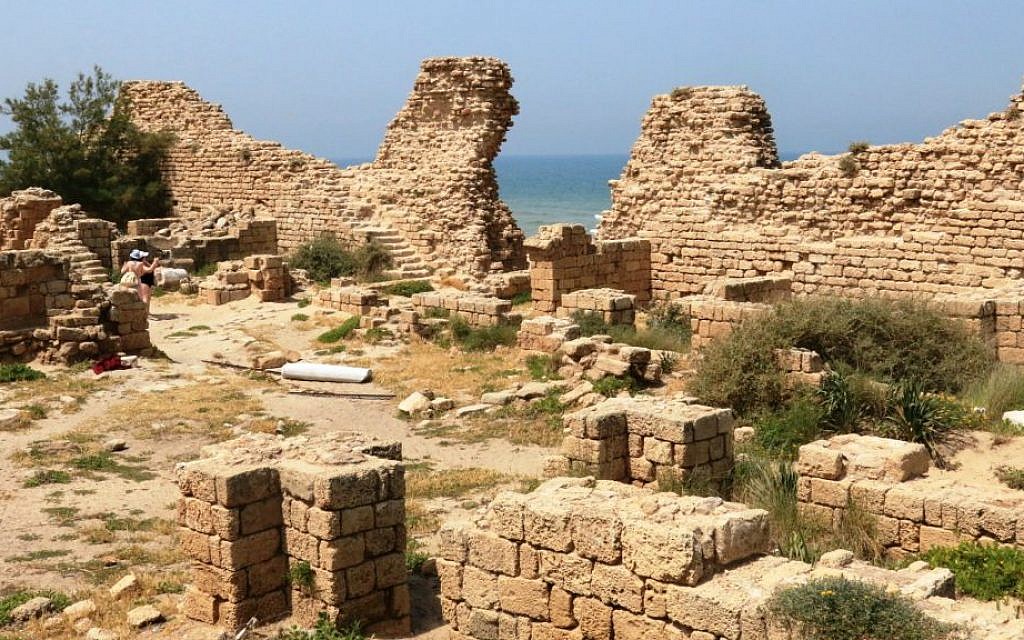And they got up early in the morning the next day, and behold, Dagon had fallen with his face to the ground before the Ark of Adonai, and the head of Dagon and the two palms of his hands were cut off on the threshold.
1 Samuel 5:4
1 And the Philistines took the Ark of God from Even-etzer and brought it to Ashdod.
After capturing the Ark, the Philistines carry it to one of their chief cities, Ashdod. Ashdod was one of the five ruling city-states of the Philistines along the coastal plain and was independently ruled.
2 And the Philistines took the Ark of God and brought it to the house of Dagon, and left it beside Dagon.
From what we can tell, Dagon is the chief deity of the Philistines. Exactly what Dagon was the god of is a bit tricky to answer. For a long time, it was assumed that Dagon was a god of the sea. This made sense because the Philistines were of the “Sea-Peoples” and because the name, Dagon, includes the word for “fish,” dag, and as such was thought to have been depicted as a being with the head and torso of a man and the tail of a fish. However, there is now evidence showing that many ancient peoples worshiped Dagon, and some were situated far from the sea. This has led to a theory that Dagon was the god of the harvest, as the name, Dagon, is similar to the word for grain, dagan.
They bring the Ark, which they view as an idol of the Israelite God and place it at the idol of Dagon’s feet (if he has feet). This would be done to show that Dagon overpowered the Lord in battle, and now the Ark of the Lord sits subservient to Dagon.
Something interesting to note, the Hebrew uses the pronoun oto, “him” in English, when referring to the ark, as opposed to ze, “it.” This may be because the Ark does represent the presence of God, and thus adopts descriptions befitting God. This chapter also refers to the idol of Dagon as oto, “him,” though it also is an inanimate object, as it represents Dagon.
3 And the Ashdodites rose early the next day, and behold, Dagon had fallen with his face to the ground before the Ark of Adonai. And they took Dagon and set him in his place.
When the people of Ashdod went to the temple the next day, the idol of Dagon had fallen over, prostrate, before the Ark of the Lord. They tried to make the Ark look subservient to Dagon, and now Dagon himself lies subservient to the Ark. Dagon did not bring victory to the Philistines over the Israelites and the Lord, rather God allowed the Ark to be taken because of the sins of the Israelites. That thought scares the Philistines, so they try to pass it off as a fluke and set Dagon back up.
4 And they got up early in the morning the next day, and behold, Dagon had fallen with his face to the ground before the Ark of Adonai, and the head of Dagon and the two palms of his hands were cut off on the threshold. Only Dagon was left on it. 5 This is why the priests of Dagon and all who come to the house of Dagon do not tread on the threshold of Dagon in Ashdod to this day.
Dagon falls prostrate before the Ark of the Lord again, showing that this was not an accident. This time the idol broke as it fell, hitting the “threshold,” probably some sort of barrier, wall, or step that separated this chamber, the equivalent of the Holy of Holies, from other parts of the temple. The head and hands have broken off of the idol, and the body lies overtop of this threshold. The priests seem to blame the destruction of the idol on the threshold, so they make a rule saying that no one should step on it.
6 And the hand of Adonai was heavy on the Ashdodites, and they trembled. And he struck them, Ashdod and her territory, with boils.
As long as the Ark was in Ashdod, God punished the Philistines living there with some sort of sickness. Different Hebrew manuscripts use different words for this illness, some using ‘afalim, “boils,” and some using tehorim, “tumors,” with a common translation of both words being “hemorroids.” In any case it was a sickness that featured some sort of painful bump or growth on the skin of the people, and it affected the entire region.
7 And the men of Ashdod saw that it was so, and they said, “The Ark of the God of Israel will not dwell with us, for his hand is heavy upon us and upon Dagon our god.”
It doesn’t take long before the people of Ashdod realize that their problems stem from holding the Ark of the Lord captive.
8 And they sent and gathered all the rulers of the Philistines to them, and said, “What should we do with the Ark of the God of Israel?” And they said, “Bring the Ark of the God of Israel around to Gath.” And they brough the Ark of the God of Israel around.
The Philistine leaders from their five chief cities meet together to discuss what to do with the Ark. This shows that while each city-state is independently ruled, they are still a single people, and sometimes take counsel with each other. Here the issue at hand is simple. The Philistines captured the Ark, but the Philistines at Ashdod don’t want it, because it seems to be causing problems. However, they don’t want to just hand it back to the Israelites, which would be humiliating. So, the leader of Gath volunteers to take custody of the Ark.
9 And it was after they brought it around, and the hand of Adonai was against the city and there was a very great panic. And he struck the men of the city from the small to the great, and boils broke out on them.
What happened in Ashdod happens in Gath upon the arrival of the Ark of the Covenant.
10 And they sent the Ark of God to Ekron. And it was as the Ark of God entered Ekron, and the Ekronites cried out for help saying, “They brought the Ark of the God of Israel around to me to kill me and my people!”
After everyone in Gath gets sick, they decide to send to Ark to Ekron, another major city of the Philistines. The Ekronites have heard about what happened in Ashodod and Gath and want nothing to do with it.
For some reason, the last bit of this verse is in the singular, when the subject of the sentence is plural. This is actually not a problem in Hebrew, as when multiple people speak with one united verse, the singular is often used.
11 And they sent and gathered all the leaders of the Philistines, and said, “Send away the Ark of the God of Israel and return it to its place, that it will not kill me or my people.” For a panic of death was in all the city, and the hand of God was very heavy there. 12 And the men that did not die were struck with boils. And the scream of the city went up to the heavens.
Even while Ekron is meeting with the leaders of the Philistines to send the Ark away, the people of the city are getting sick and dying from the boils. The council agrees to send the Ark back to Israel, it is not worth the plague they have been facing.
In an interesting twist, the Philistines are calling to the heavens for help, something that the Israelites usually do. When the Israelites do it, God usually responds with aid. Now even Israel’s enemies are calling out for help. It is a subtle reminded that God hears the cries of all, not just the Israelites.
Last chapter the Israelites called out to God, for they lost the Ark. Now the Philistines are calling for help because of the Ark. Next chapter will discuss the solution God brings.



